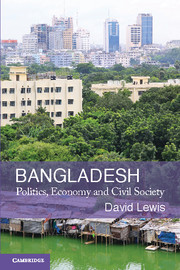Book contents
- Frontmatter
- Contents
- Maps
- Abbreviations
- Acknowledgements
- 1 Introduction
- 2 A State in the Making
- 3 Towards Bangladesh
- 4 State, Politics and Institutions
- 5 Nongovernmental Actors and Civil Society
- 6 Economic Development and Transformation
- 7 Population, Natural Resources and Environment
- 8 Conclusion
- Glossary of Bengali Terms
- Bibliography
- Index
2 - A State in the Making
Published online by Cambridge University Press: 05 June 2012
- Frontmatter
- Contents
- Maps
- Abbreviations
- Acknowledgements
- 1 Introduction
- 2 A State in the Making
- 3 Towards Bangladesh
- 4 State, Politics and Institutions
- 5 Nongovernmental Actors and Civil Society
- 6 Economic Development and Transformation
- 7 Population, Natural Resources and Environment
- 8 Conclusion
- Glossary of Bengali Terms
- Bibliography
- Index
Summary
Bangladesh is a comparatively new nation that is still in the process of taking shape – hence, it remains a “state in the making.” It became an independent country on December 16, 1971, when, after a violent liberation struggle, it seceded from Pakistan. Under the hastily drawn up arrangements for the partition of British India in 1947, a homeland for Indian Muslims had been created with two wings, known as West Pakistan and East Pakistan, that were separated by more than twelve hundred miles of Indian terri-tory. East Pakistan, populated mainly by Muslim Bengalis, quickly became the subordinate partner in the new country and faced internal economic exploitation and clumsy attempts to impose Urdu as the national language of Pakistan. National elections in 1970 gave the Eastern wing a majority of assembly delegates, and after a vicious West Pakistani military clampdown, the nationalist resistance movement eventually secured victory. Events during this period of the country's formation have been vividly brought to life in Tahmima Anam's novel A Golden Age (2007). During the conflict, the Pakistan army is believed to have killed more than a million Bengalis in a systematic genocide designed to bring the renegade province back under control. With large numbers of refugees pouring across the border into West Bengal, Bangladeshi forces were also aided by the Indian army because India saw an important political opportunity to secure the breakup of Pakistan.
During the four decades that followed what was a tumultuous episode in twentieth-century postcolonial history, Bangladesh has continued to evolve and change. The country has faced serious problems throughout its history: from the terrible cost in human lives inflicted by the Pakistan army during its bloody inception, extensive and pervasive poverty, and environmental vulnerability, to a continuing set of problems relating to political instability and poor governance. Yet Bangladesh has also made considerable progress during this time, challenging those who prophesied that the new state would be unviable. Bangladesh has shown the world that it has been able to expand its food production substantially, develop important new export industries such as ready-made garments and shrimp, improve areas of its health-care and education social sectors through concerted government action and point the way to new potential solutions to global poverty problems through the innovative work of some of its NGOs. It is precisely because of the scale of problems that Bangladesh has experienced, and the resilence and creativity that this has instilled in its people, that many now see the country as a “laboratory for innovative solutions in the developing world” (Beit 2011).
- Type
- Chapter
- Information
- BangladeshPolitics, Economy and Civil Society, pp. 12 - 40Publisher: Cambridge University PressPrint publication year: 2011



